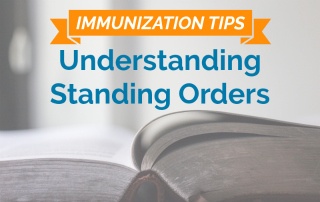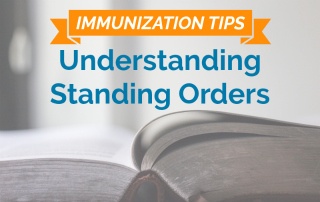Immunization Tips: Understanding Standing Orders

 Pharmacists are becoming increasingly involved as healthcare providers. Every pharmacist in the United States can provide some type of immunization given that they are properly licensed. States have finally started recognizing pharmacists as key members of the immunization community.
Pharmacists are becoming increasingly involved as healthcare providers. Every pharmacist in the United States can provide some type of immunization given that they are properly licensed. States have finally started recognizing pharmacists as key members of the immunization community.
A large part of implementing a successful immunization program is understanding all the components needed in order to offer the best services to your patients, while protecting your pharmacy. However, we have found that some pharmacists do not want to offer immunizations because it can be overwhelming when getting started. In this post we break down a big part of running an immunization business... understanding standing orders.
Written Prescriptions
A written prescription is the easiest type of order when administering a vaccine. The patient will bring in a prescription for a vaccine and give it to the pharmacist. The pharmacy may administer the vaccine from the written order to the patient and it allows you to immediately let you take care of the patient.
Standing Orders
A standing order is like a blanket order. These documents are a baseline template started at the Centers for Disease Control (CDC) and work in conjunction with the Immunization Action Coalition (IAC) in St. Paul Minnesota. The IAC creates the template for all the standing orders. These documents can be amended but it is recommended that you stay with the standards. Standing Orders are signed by a local physician within your state. Once signed it then gives you permission to inoculate anyone with that particular vaccine.
Pharmacist tend to assume that the standing orders they have signed should be good for years. However, vaccines change and so does the treatment, take note of these two simple recommendations:
- It is best that you get your standing orders renewed annually
- Talk to the physician and create a good working relationship
There are currently eight states in which State Legislators and State Board of Pharmacy have granted pharmacists the ability to sign their own standing orders. Pharmacists are finally being recognized as a vital part of the healthcare structure.
Emergency Protocols
Another document you need to have in place is an emergency protocol. This document is used when a patient has an adverse reaction to a vaccine. An adverse reaction can vary from something minor to anaphylactic shock. In any case, you need to have emergency protocols in place and get them signed by a doctor. (If you are in a state that does not require a doctor to sign a standing order it is still highly recommended that a physician signs your emergency protocols). Having a physician date and sign the protocol gives the pharmacist more protection.
However, an emergency protocol is an ever-changing treatment procedure for a patient who has gone into distress from a vaccine. It is extremely important that you have this procedure in play and that you are prepared for an adverse reaction. Adverse reactions do happen, and the more vaccines you administer the higher the chance that you are going to have a patient that experiences one. If you do have a patient that does have an adverse reaction you will need to contact your liability insurance carrier and submit a claim. When you submit the claim to your insurance carrier they will ask you to send them your policy & procedure manual.
Immunization Policies & Procedures - Why are they important?
Currently, there is no federal mandate for pharmacies to have policies & procedures for immunizations. However, the American Pharmacists Association’s training program strongly recommends that you have a set of policies and procedures in place. Now is the time to start educating yourself on adverse reactions. Call your insurance company and make sure that you’re covered in case you have a patient that has an adverse reaction. It’s better to find out today what you need, rather than later.
Want to advance your immunization program – R.J. Hedges & Associates can help!
If you need help with your immunization program, R.J. Hedges & Associates has a complete, turn-key Immunization Compliance Program. We work closely with the CDC and IAC and our program will show you how to get started and set up your pharmacy to do vaccines from start to finish.
Our program includes:
- All your policies & procedures
- Storage requirements
- Customized standing orders
- State specific requirements
- Bloodborne Pathogen plan
We will also provide you with:
- Screening questionnaires
- Vaccine immunizations sheets
- Many other resources for offering vaccines including worldwide travel vaccines

